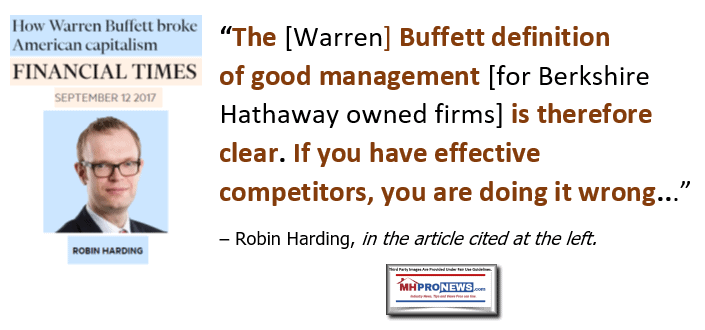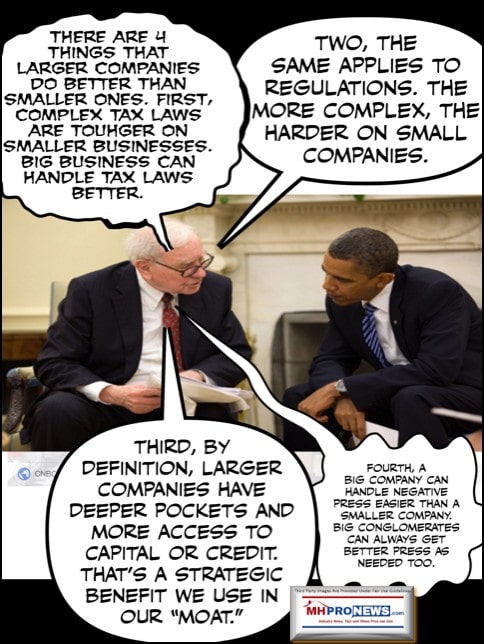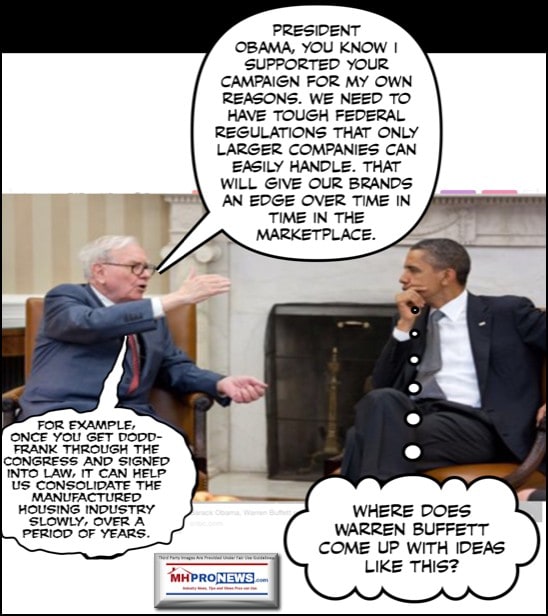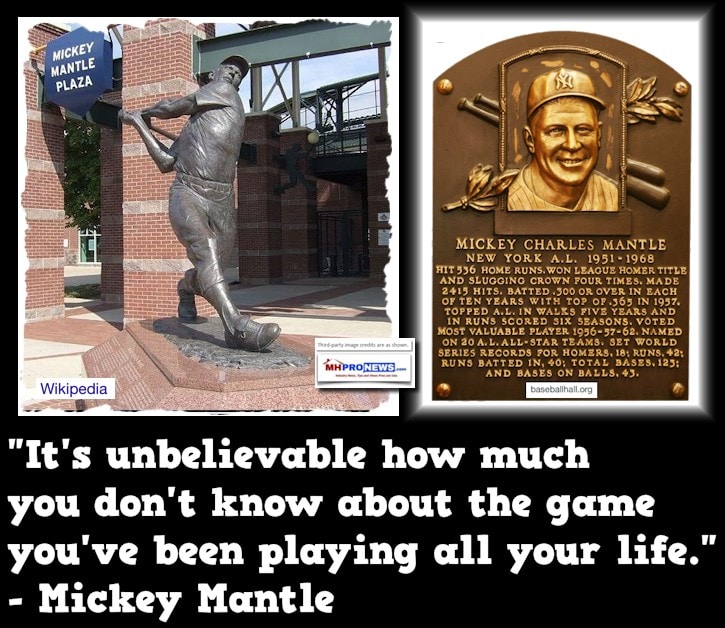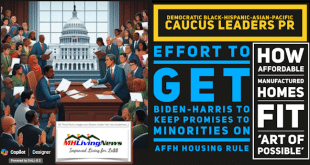“It’s unbelievable how much you don’t know about the game you‘ve been playing all your life.”
– Mickey Mantle per BrainyQuote and opening quote in hit Moneyball.
“I didn’t even want to meet Warren [Buffett] because I thought, ‘Hey this guy buys and sells things, and so he found imperfections in terms of markets, that’s not value added to society, that’s a zero-sum game that is almost parasitic.’ That was my view before I met him … he wasn’t going to tell me about inventing something,”
– So said billionaire William “Bill” Gates III – Microsoft/Gates Foundation,
major Berkshire Hathaway shareholder – per CNBC.
Advocates, researchers, public officials, and investors are among the array that say that HUD Code manufactured housing – a.k.a. manufactured homes – are the most proven form of permanent homes in the U.S. Period. Whatever is number two is not even close to being as affordable, resilient, safe, and can appreciate in value – per federal research – much like conventional ‘site built’ housing.

But that well proven value proposition doesn’t mean that the manufactured home industry is without problems. There are several issue, which this platform has advised home seekers, home owners, researchers, and others for some 9 years (Mobile and Manufactured Home Living News – a.k.a. MHLivingNews launched on June 18, 2012).
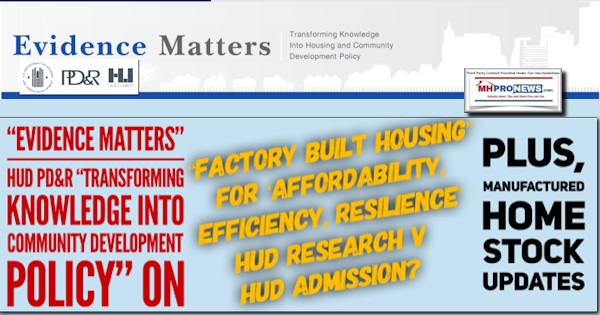
For potential or actual manufactured homeowners, you would be well advised to invest the time to fully understand what has been occurring in the industry and what’s behind the headlines. For instance, much of the negative media – sadly, but often aptly – about manufactured home living is associated with those who are living in a land-lease.
But some 2 out of 3 new manufactured homes are going to private property, which means that they are not going into an old pre-HUD Code mobile home park (MHP) or into a newer manufactured home community (MHC). Noting that MHProNews/MHLivingNews are evidence-based critics of the Manufactured Housing Institute (MHI) and several of their claims, per MHI in May 2020, “63% of new manufactured homes are placed on private property and 37% are placed in manufactured home communities.”
MHI also said on in that document that “The need for quality, affordable housing has never been greater. Today’s manufactured homes can deliver outstanding quality and performance at prices that are up to 50 percent less per square foot than conventional site-built homes. These savings allow more and more Americans to own their own home, even in the face of an ever-widening housing affordability gap.” More precisely, manufactured homes may offer greater savings than 50 percent or less, depending on an array of possible factors. But suffice it to say that with some 22 million Americans living in pre-HUD Code mobile homes, but mostly post-HUD Code manufactured homes, they are collectively the most proven form of affordable housing in the U.S. for decades. They remain the most proven path to affordable home ownership.


That said, the issues that dog manufactured housing at first appear to be complex. Indeed, some who have worked in, lived in, or studied the industry for decades may or may not completely understand those dynamics. That is the reason for the Mickey Mantle quote at the top – “It’s unbelievable how much you don’t know about the game you’ve been playing all your life” cited in the movie Moneyball. As a disclosure that may help others, this author, who has had roughly 30 years in manufactured housing plus other business, historic, research, publishing, and other related professions took years to understand what was actually near or at the heart of the industry’s woes. It is self-evident that during an affordable housing crisis, affordable homes should do very well.
Which begs the question. Why is the manufactured home industry underperforming when compared to conventional housing, or even the RV business, when someone looks back to 1998 as the last highwater mark year? Because that is what the facts tell us.
There is more on that issue and more in the groundbreaking report linked below.


The disclosure said, what has now become clear is this. When the issues that are behind manufactured housing’s image and other woes are carefully studied and unpacked, several issues – surprisingly to some – boil down to common culprits. Some are forces outside of the industry, as researchers such as James A. “Jim” Schmitz Jr. and his colleagues have identified and documented for the Minneapolis Federal Reserve and others. But again, Strommen’s third-party research sheds much light on how it is forces inside manufactured housing that are often to blame for image, regulatory, legal, financing, and other woes. Indeed, MHI and their dominating brands have been confronted with those concerns on numerous occasions, publicly and via email. Time and again, they have ducked engagement. That despite the fact that just a few years ago, their leaders publicly and in some cases repeatedly praised this publication and our sister site for being fair, evidence- and fact-based publishers.
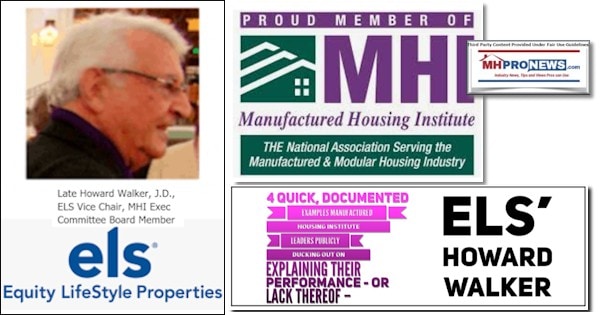
The Manufactured Housing Association for Regulatory Reform (MHARR) and pro-manufactured home non-profit advocate Doug Ryan, and some who have long served inside MHI are among those who have accused MHI of being involved in schemes that undermine both ‘mom and pop’ independents and consumers alike. This is one of several reasons that this writer has increasingly advocated the wisdom of ‘white hat’ manufactured home businesses and authentic consumer advocates to work together to fix what has gone wrong in the industry.
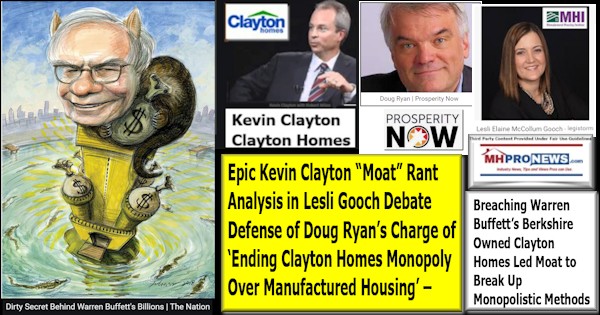
What’s gone wrong in many ways boils down to Bill Gates insight about Buffett, which Rolfe, Buffett himself, and others have observed.
The above is about 925 words. “900 words will take about 3 minutes to read for the average reader,” per sources such as CapitalizeMyTitle. Let’s make that an executive summary that introduces this critical topic. But key in mind that an introduction is the starting point and not the finish line. Moat builders think long-term. Moat builders are often self-proclaimed readers and thinkers. The moat-builders say this about themselves.
Therefore, those who oppose the moat builders must be prepared to think long-term and do reading for understanding as the basis for effective action too.
The Buffett and his Berkshire partner Charlie Munger, J.D., concept of “the moat” – or at times, “the castle and the moat,” and “durable competitive advantages“ – are often a part of what has gone wrong in manufactured housing. The moat, per Buffett and his followers, is a method to keep competitors out, and to slowly over time eliminate competitors. As competitors are eliminated, the increasingly well-known problems that result from monopolization become more apparent. The question is, are these moat methods pernicious methods legal, as Frank Rolfe and others claim?

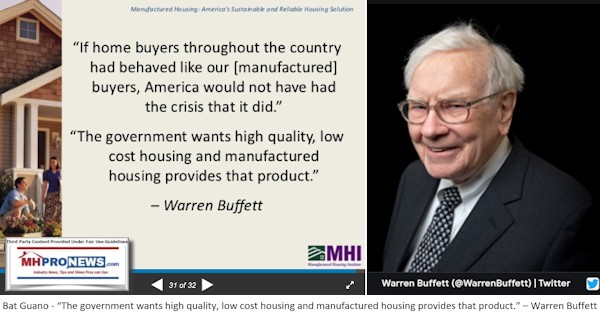
Per Strommen, and others, the answer is no.
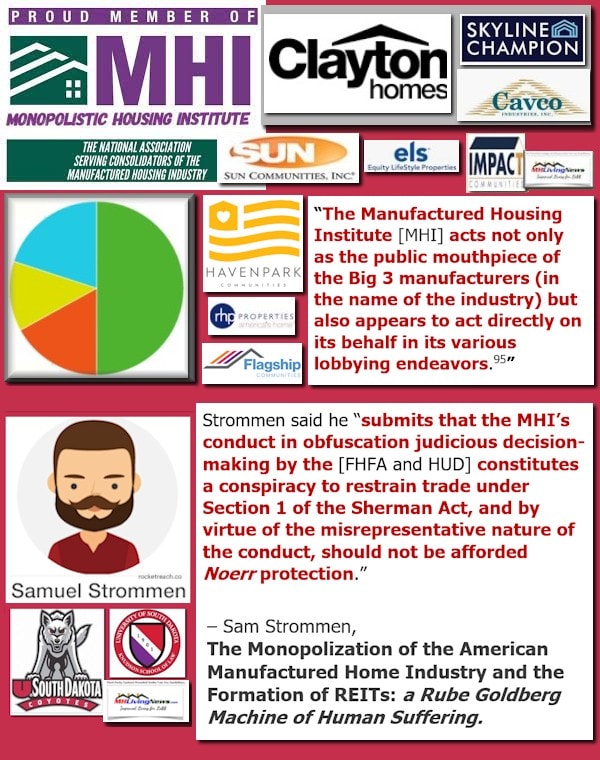
That may be a key point in the battle for affordable housing and for protections for manufactured home owners. The now late Robert “Bob” Van Cleef began to understand that issue, and blogged about it. He’s been cited here several times.
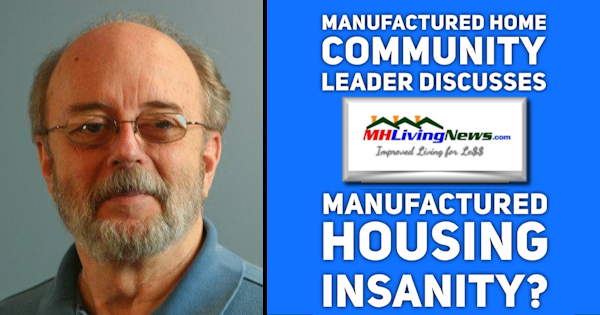
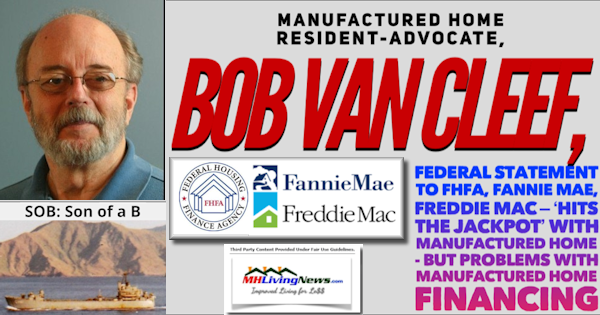
The question is, how many others among community advocates realize what has gone wrong and how it could be addressed through existing laws?
That’s important.
- Because what Strommen, Van Cleef, and others believed that existing federal laws offer possible tools to legally punish those who are building moats in a manner that crosses legal lines.
- Various laws on the books could benefit existing and millions of potential new manufactured homeowners.
- Instead of repeatedly doing the same things that have failed for decades to perform as hoped, the time has come for committed, caring, and motivated people of all backgrounds to dig in, understand what is occurring behind the curtain, and then deal with those root issues.
While there may be well intentioned lawmakers proposing or trying to implement various laws, they have routinely proven to be ineffective at getting to the root issues. That’s not a slam on those who backed those laws, if they did so in good faith. It is not a slam on those who passed those laws, if they did so in good faith.
Per the Associated Press (AP) and the Denver Post:
“Residents say this is life at a mobile home park run by RV Horizons-Impact Communities, a company on Colorado’s Western Slope that stakes its claim as the fifth-largest owner of mobile home parks in the United States. Lawsuits, compliance complaints and protests against the company are piling up — and state regulators are taking notice.” Frank Rolfe and Dave Reynolds are the apparent partners in Impact Communities, Mobile Home University, (MHU), brokerage, and an array of other businesses involved in the manufactured home sector, particularly focused on land-lease communities.

That complaint center that is taking consumer complaints is the oddly named Colorado “Mobile Home Park Oversight Program” – called MHPOP. Its oddly named because perhaps ¾ths of all such housing units are manufactured homes, only about ¼th are true pre-HUD code mobile homes or even older trailer houses. If state officials can’t get the terminology right, why is it a surprise that the public doesn’t understand the terminology either?
- Not every cell phone is a smart phone, but every smart phone is a cell phone.
No mobile home – a permanent housing unit built on a chassis before June 15, 1976 – is a manufactured home. That’s a legal term, which means that the home was built to meet or exceed the standards set forth in the federal manufactured housing construction and safety standards act passed in 1974 which went into effect on June 15, 1976. Note that even numbers of pre-HUD Code mobile homes may have been built – or later upgraded – to the standards similar to a manufactured home. Nevertheless, a manufactured home is not a mobile home, and a mobile home is not a manufactured home.


With the moat in mind, let’s test this thesis for the next few moments. Let’s see if at or near the heart of the issues undermining manufactured housing are those that
Per Self-Declared Buffett Moat Method Advocate the Notorious Frank Rolfe…
Notorious Manufactured Housing Institute (MHI) member Frank Rolfe – mobile and manufactured home community consolidator, investor, broker, Mobile Home University ‘educator,’ etc. interests in manufactured housing said this. “The “Moat” Keeps Getting Wider And Deeper.”
“Warren Buffett has long championed the concept that all great business models share one big attribute: a “moat”. This “moat” protects that business from competition and from other damaging risks to profitability. Mobile home parks have long held the position of having one of the largest “moats” in the United States, and it just keeps getting wider and deeper, to the chagrin of many who find it “unfair”.” – Frank Rolfe.
Pondering the above, consider what manufactured home owner, elected public official, and manufactured home advocate Fred Neil said in comments emailed to MHLivingNews.
“You do not need expertise to understand that housing is a cornerstone of our economy. You do not need expertise in housing to know that the high cost of housing puts pressure on the minimum wage…When it comes to Apartments and Leased Land Communities there is no competition. Therefore, there is nothing to drive rents down or stabilize them. For those of us on leased land, egregious inequities in State Law permit exorbitant annual rent increases. As an example, RHP, part of a huge conglomerate, purchased my community the end of October 2017. Our lot rent was $505 per month, As of 2021, lot rent is at $635 per month…a $130 per month increase. RHP raised lot rents at shocking increases at all 5 leased land communities they purchased in Delaware since 2017.” So said Neil, who is serving his 3rd Term as a member of the Dover City Council.
Let’s review a few key points before probing statements made by self-proclaimed moat-advocate Rolfe, some as recently as this year.
- Gates described Buffett as someone who finds ‘weaknesses in markets.’
- Gates described Buffett as someone who did not do value adding.
- Gates described Buffett as someone who worked in an ‘almost parasitic’ fashion. A parasite, it is instructive to know, is defined by the CDC “A parasite is an organism that lives on or in a host and gets its food from or at the expense of its host. Parasites can cause disease in humans.”
- Without using the phrase “the moat” in that reference to Buffett and his business methods, that is effectively what Gates is describing.
Who says? Consider this: “The bottom line advice—what Bill Gates learned from Warren Buffett—is that you need to be thinking about your “moat.” – per Stewart Gandolf, MBA.
Note that Gates, who before meeting Buffett said he didn’t want to do so, have now been not only apparent friends, but business and nonprofit allies. For those who have failed to understand that nonprofits are not necessarily authentic philanthropy, see what Buffett’s own son Peter Buffett has said.

Per a longtime self-proclaimed Buffett admirer, Robin Harding, per his own statement, came to a sobering realization that Buffett’s meaning behind the moat was anti-competitive. It is a way of thwarting and killing off competition.
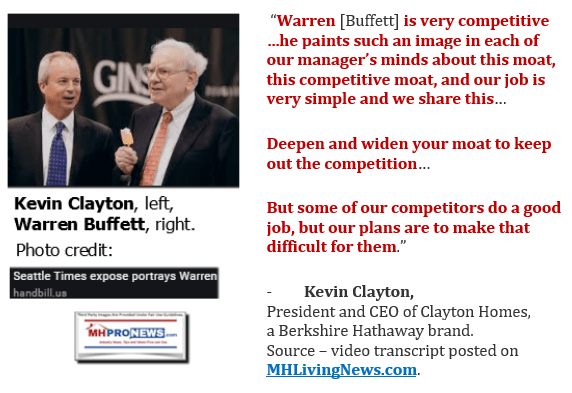
With that backdrop, here is what Buffett himself has said.

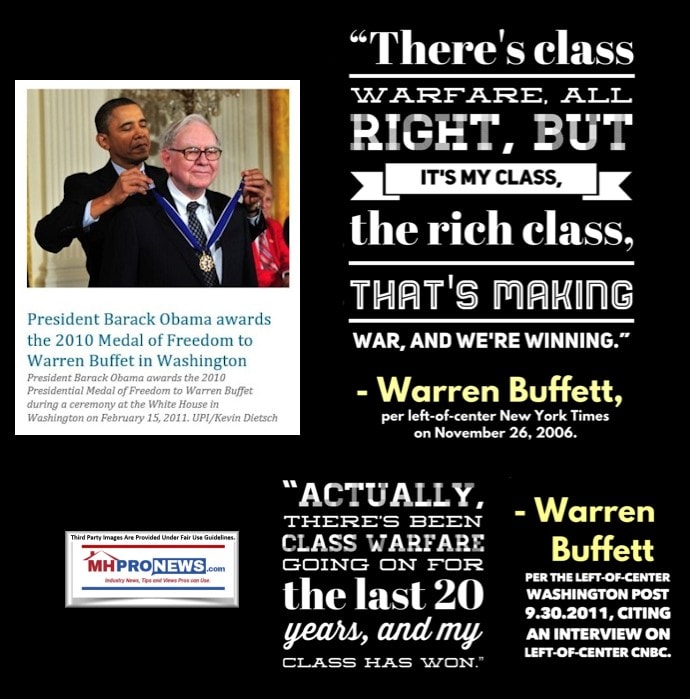
For those who might think that this is just a problem in manufactured housing, that would be mistaken. Who said? Buffett himself.
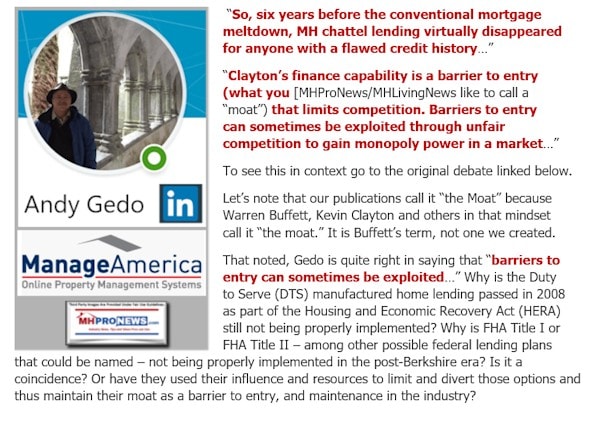
So, let’s sum up again. Per Buffett, Gates, and those who have studied and/or know them through personal work, the moat is a method that aims to kill off competitors. When you kill off competitors, that is what makes predatory practices possible.

If you find someone that still might think that is a misread, here are some examples from a range of media that cross the left-right divide. They came to similar conclusions.
- The Nation, Forbes, Seattle Times, Financial Times, GuruFocus, and The Jacksonville Florida Times Union are among mainstream media that examined predatory practices including evidence-based allegations of Warren Buffett’s monopolistic “moat” methodology. Think of that in terms of Albert Einstein’s advice that he would spend more time trying to understand the problem before proposing a solution to the problem.
When it comes to manufactured housing, and several other sectors of the U.S. economy, absent a solid grasp of how Gates, Buffett, and other “moat builders” are operating, the problems that exist in our nation will not be solved.
But the opposite is also true. Once those problems are understood, once notions such as “paltering,” a mix of truth, half-truths, “deception and misdirection” are grasped, then the kind of coded language of Buffett and his ilk becomes clear. If they bluntly said they are building monopolies, they might get brought up by state and/or federal regulators on charges. So, instead, they use metaphors that describe a method that slowly but steadily monopolizes a market. In the meantime, they use friendly media and so-called “philanthropy” to make what they do seem more benign when it is arguably not only evil, but criminal. Who says? Strommen at Knudson Law, and others.
Now, with that moat method in mind, let’s look at Frank Rolfe and some of his pro-moat building commentary. Keep in mind, editorially we oppose this process and are showing his thoughts only as a means of explaining what he is doing, and what he is teaching others to do. Some investors may find this article and think Rolfe, Buffett, Gates, Kevin Clayton, and others to be ‘smart.’ But that ‘smarts’ is arguably illegal, despite Rolfe saying otherwise.
Per Rolfe, here is how he pitches possible investors on the glories of buying up manufactured home communities, that he calls mobile home parks. Rolfe is connecting this with the moat in his own words. That’s important, because state and/or federal officials could then use this against Rolfe and other moat-builders, who are often MHI members. Among them might be RHP Properties, that Fred Neil named above. Havenpark Capital and an array of others could be mentioned too.

With that understanding, here are Rolfe’s talking points, and how he connects this to the Buffett “moat.”
“Warren Buffett has long championed the concept that all great business models share one big attribute: a “moat”. This “moat” protects that business from competition and from other damaging risks to profitability. Mobile home parks have long held the position of having one of the largest “moats” in the United States, and it just keeps getting wider and deeper, to the chagrin of many who find it “unfair”. In this Mobile Home Park Mastery podcast, we’re going to analyze why the “moat” keeps growing and why it’s the result of megatrends that nobody has the power to divert.” – Frank Rolfe.
Also, per Rolfe’s pitch to investors:
The demand for “affordable housing” goes up in bad economic times. Mobile homes are the least expensive form of dwelling in the U.S. During economic declines, the demand for cheap housing skyrockets, and this places mobile home parks in the sweet spot of demand during every crisis.
- There is a huge barrier to new construction in virtually every city in the U.S. Warren Buffett always talks of a “moat” — which means a barrier to competition – as one of the key drivers to a successful business model. And mobile home parks have perhaps the largest moat in the U.S.: the complete shutdown of zoning for new mobile home park construction in virtually every American market. And it’s not a new feature as it’s been that way for over a half-century.
- The customers never leave because the value is so high.
- You can buy them from the original moms and pops at lower prices. This simple feature produces a huge amount of value for the buyer. Moms and pops are less sophisticated and, therefore, they ask less for properties and there is always plenty of room for improvement in the net income by increasing rents and occupancy coupled with lowering costs (typically manager and utility line items).
Additional Insights…
Per Ishbel Dickens, J.D., prior Executive Director of the National Manufactured Home Owners Association (NMHOA) – in formal comments to Congress (quotes may not be in original sequence delivered).
“It is unlikely that a manufactured home purchaser will ever need to buy another manufactured home…
- First of all I think it would be extremely helpful if the industry could support better financial tools for the purchase of manufactured homes.
- Second, having the industry work with home owners to secure long term leases in manufactured housing communities, as well as reasonable rent structures and other legal protections, would go a long way towards encouraging potential purchasers to buy manufactured homes.
- Finally, having the consumers and the industry work together to improve the “image” of manufactured housing,… [work to make manufactured homes in communities] an asset that will have increased equity over time could really help boost the sales of manufactured homes. Thus the opportunity for manufactured home owners and industry representatives to meet together through the MHCC [Manufactured Housing Consensus Committee, established by the Manufactured Housing Improvement Act of 2000 – MHIA] has real benefit and I would hope that we can continue to explore areas of mutual interest for the betterment of all concerned.”
When a statement is important enough, we periodically take those and turn them into a quotation graphic to be used again when it seems to apply.
Ex-NMHOA President Tim Sheahan, a manufactured home owners and resident said this.
Manufactured home resident/advocates Sheahan, Neil, and Van Cleef have at various times made the evidence-based point that when there is competition, it benefits consumers, including manufactured home owners. But when there is a lack of competition, that is what benefits the predatory firms, like Rolfe and Reynolds apparently enjoy operating.

About two years ago, MHLivingNews spotlighted how a previous pitch by Rolfe never to build a new (errant terminology he misuses on purpose) “mobile home park.”

Later, we spotlighted that Rolfe essentially confirmed that concern raised by the MHLivingNews report linked above. Note: the next to linked articles seem to look alike, because they are both about a similar theme. But the report below is from September 17, 2020. The one that follows is from September 2021. Only MHLivingNews/MHProNews, among industry trade publishers, are monitoring and periodically reporting on the issues that impact the consumers, white hat (as opposed to black hat) investors, businesses, advocates, taxpayers, and others.
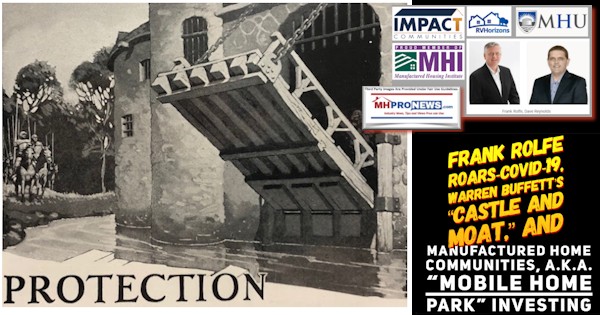
More recently still, MHProNews published this report linked below that once more tied the moat, Rolfe, and his ilk at the Manufactured Housing Institute (MHI) to this moat building methods. Note, as resident-advocate Fred Neil seems to understand, the solution to these issues is not to blast all capitalism in general, but rather to call out and stop predatory capitalists. As a look at the writings of the late resident-advocate Bob Van Cleef seemed to grasp that notion too.
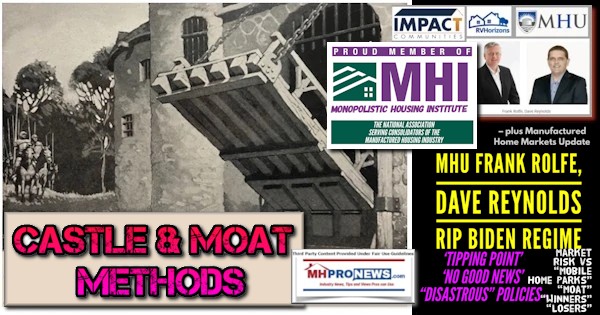
This is a problem that any manufactured home residents can not afford ignore. There are arguably authentic, fence riding, and merely posturing ‘advocates’ for manufactured home residents. That is akin to MHI arguably posturing working for all segments of the industry, when the evidence and researchers like Strommen have concluded that they are working for consolidators. That apparently includes Rolfe, RHP Properties, Havenpark, Flagship Communities (formerly SSK Communities) and others cited in reports like those linked herein and below.

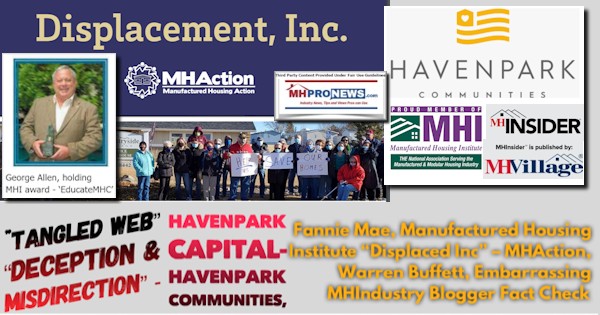
It is not easy for people who are essentially honest to realize that some people can be so devious as to deliberately and routinely lie in clever and bold ways.
Buffett and Gates are no saints.
Rolfe and his buddy/partner Dave Reynolds may have formed a ‘nonprofit’ called “Impact Cares,” but a close look makes it clear that this is but one more Buffett-style move. It is part of “Deception and Misdirection,” and may produce a veneer of respectability and free or low cost publicity, when what they have said is anything but decent.
“Push rents relentlessly.”
– Dave Reynolds.
For skim readers (not recommended for our reports), this is not an endorsement
of Reynolds, Rolfe or ANY predatory brand’s ‘black hat’ behavior. MHLivingNews/MHProNews
strongly believe that there are white hat brand’s that merit support, and black hat brands that merit
investigation and potential criminal prosecution.
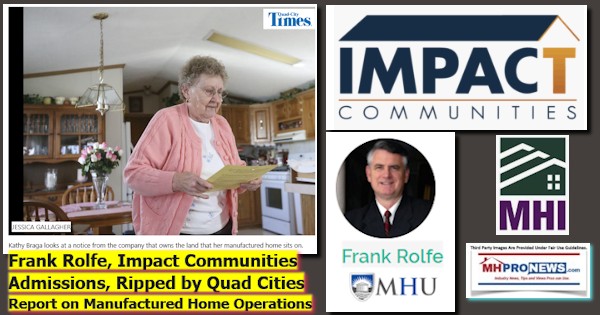

Resident advocates MHPOA have cited that quote by Reynolds. Reynolds apparently used it himself in a paid press release to potential investors. MHLivingNews and MHProNews have used it to spotlight what they people are doing, so that authentic advocates, public officials and others know what they are up against.
As a closing thought, the FTC may offer some possible options. There are some claims that several of these MHI member consolidators are making that are arguably false advertising. Some at MHI itself is arguably guilty of making false statements under oath (perjury), false advertising, and possible “felony” antitrust and RICO violations.

Colorado Mobile Home Park Oversight Program MHPOP – December 2020 Update _MHPOP_FINALv2 Col
Community residents and their authentic, vs. merely posturing, advocates may want to explore the Hobbs Act as another option. Until some of these predatory people are brought up on felony charges by public officials, expect all else to be of little or no benefit.
David “Valleau, the Colorado Poverty Law project housing attorney, called the oversight program a “great resource,” citing the free cost and accessibility for people without a legal background,” per the Denver Post. “I think it has great potential,” he said. “I think they’re amazing, but in the first year of implementation, there’s a lot of room for improvement.”
There are numerous examples of well intentioned laws that have not lived up to their hype. That doesn’t mean that they might not work better, at some point in time. But there are federal laws that already exist, some of which have state level counterparts. It is those laws that will bring not only financial penalties – which moat builders may use to their benefit, and pass it along as a cost of doing business – but possible prison time that there is hope that meaningful change in the problem areas a positively addressed.
- Colorado Oversight MHPOP Program Review Document
- Colorado MHPOP complaint review document (NOTE: per officials, this is running behind, but they encourage complaints. Don’t delay and be patient).
Until then, seek out honest independents who plan to be in the business for the long haul. See the related reports to learn more.
Finally, membership in MHI – even a so-called “award winning” member – should not be a reason to ‘trust’ a company. Indeed, per a Democratic staffer to our publication, MHI has a reputation in Washington, D.C. for being anti-consumer. Are handing out awards to aggressive member brands bent on consolidating the industry part of MHI’s “Tricks of the trade?”
“We Provide, You Decide.” © ##
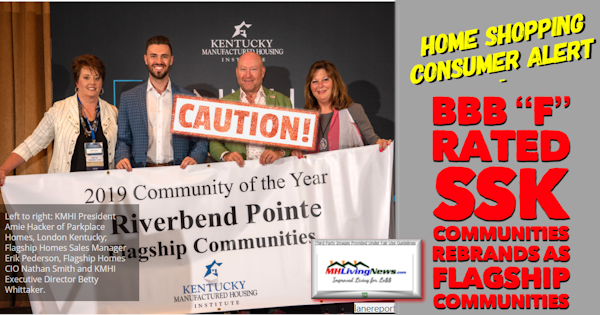
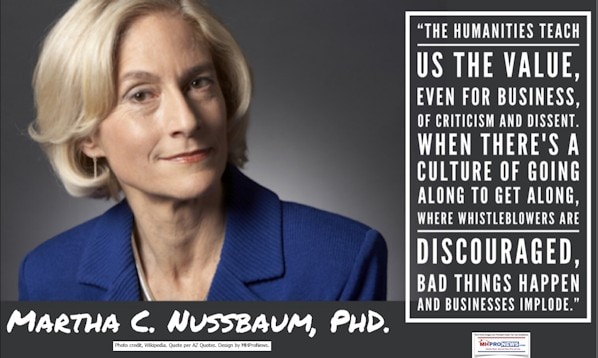










We lay out the facts and insights that others are too lazy, agenda-driven, or otherwise uninformed to do. That’s what makes our sister site and this location the runaway leaders for authentic information about affordable housing in general, the politics behind the problems, and manufactured homes specifically. That’s a wrap on this installment of “News through the lens of manufactured homes and factory-built housing” © where “We Provide, You Decide.” © ## (Affordable housing, manufactured homes, reports, fact-checks, analysis, and commentary. Third-party images or content are provided under fair use guidelines for media.) (See Related Reports, further below. Text/image boxes often are hot-linked to other reports that can be access by clicking on them.)

By L.A. “Tony” Kovach – for MHLivingNews.com.
Tony earned a journalism scholarship and earned numerous awards in history and in manufactured housing. For example, he earned the prestigious Lottinville Award in history from the University of Oklahoma, where he studied history and business management. He’s a managing member and co-founder of LifeStyle Factory Homes, LLC, the parent company to MHProNews, and MHLivingNews.com. This article reflects the LLC’s and/or the writer’s position, and may or may not reflect the views of sponsors or supporters.
Connect on LinkedIn: http://www.linkedin.com/in/latonykovach
Recent and Related Reports:
The text/image boxes below are linked to other reports, which can be accessed by clicking on them.


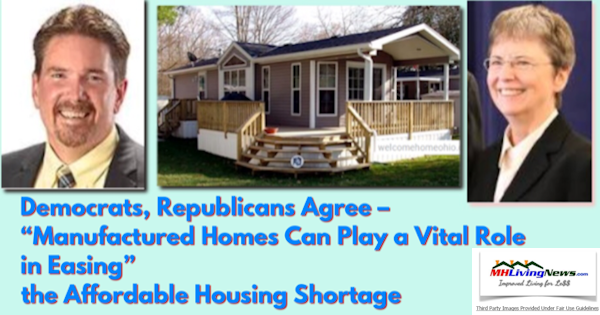
 manufacturedhomelivingnews.com Manufactured Home Living News
manufacturedhomelivingnews.com Manufactured Home Living News

